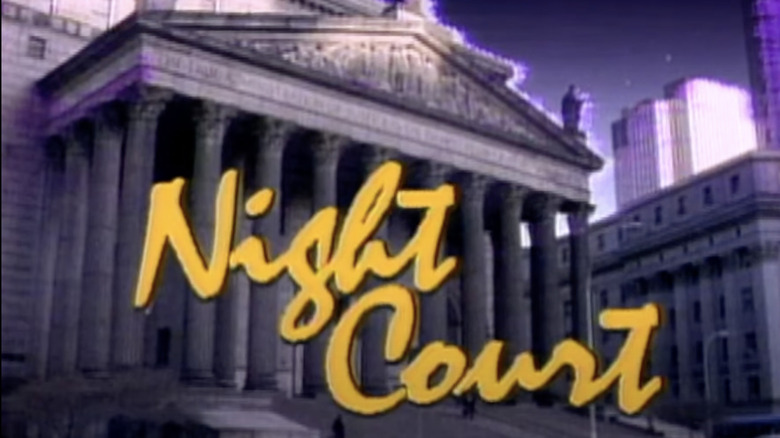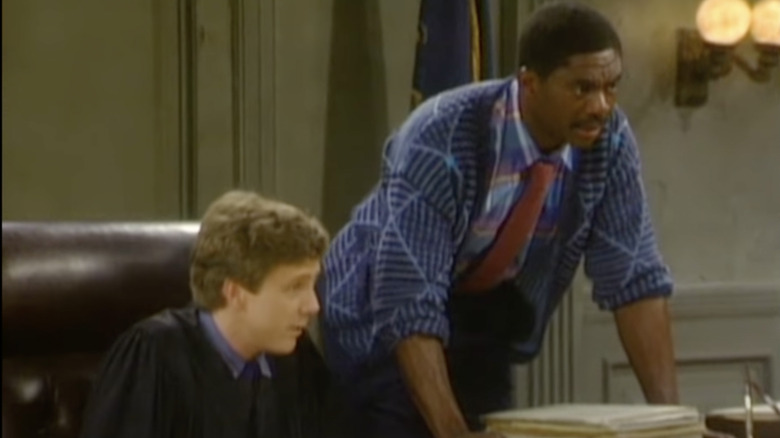My Mom Learned English From Night Court, And There Was No Better Show To Learn From
In the summer of 1984, on a humid Texas day, the United States of America welcomed three new residents: my mother, her sister, and my grandmother. Coming from the bustling and musky streets of Karachi, Pakistan, the trio landed in the land of the opportunity, picked up at the airport by my grandfather, who had taken up shop in America years prior. They reunited after years of long-distance phone calls, speculations about citizenship protocols, and whispers debating if the move would really be worth it.
My mother was 11 years old when she left the cool, air-conditioned terminals of George Bush Intercontinental Airport and sat in my grandpa's gold-colored, used American-made car, riding the highway for the first time in her life. As she peered out the window, shocked by the clash of suburbia and metropolis, she wondered if her new home would accept her.
It did.
As my immigrant grandparents pursued the American Dream, my mother accepted that life wouldn't be easy here, but luckily, resources were put in place to help her. Placed a year behind in school, my mother entered grade 5, where she spent a considerable amount of time in ESL (English as a Second Language) classes, alongside several other immigrant children. While she learned basic phrases, how to verbally agree or disagree, and say numbers in class, it was television that shaped her understanding of the English language and American culture.
The sheltered tube TV world of Asia melted away as soon as she fell in love with the classic art of the American sitcom. While "Growing Pains" and "I Love Lucy" provided idyllic views of a family-oriented America, it was the grown-up, criminal-focused "Night Court" that helped my mother get a grasp on the English language.
Night Court was a late night staple
It was 1986 and "Night Court" had been in session for two years. My mother was now in her first year of high school, still taking ESL classes, grasping more complicated facets of the English-language. There was a routine in place, one she adhered to for the rest of her teenage years: school, followed by six hours of product sorting, price tagging, and register-manning at my grandfather's convenience store. Between work-related tasks and cashing out customers, she'd complete her homework — eager to go home, veg out, and find respite in front of the television, like a true hard-working American.
And most days were "Night Court" days, where reruns were abundant. By the time she got home and was able to enjoy a microwave meal from my grandmother, the only program that managed to hold her attention were both new and old episodes of the NBC series. After a hard day of work, it was the absurdity of the cases that kept her energized.
"Night Court," the sitcom about the late-night happenings at the Manhattan Criminal Court, was the perfect show to introduce my mother to a less buttoned-up, more audacious, and irreverent America. Airing late at night, when my mother should have been asleep, "Night Court" was different from anything else she was watching on TV. It wasn't gritty or overtly mature, but it focused on subject matter that she found to be adult and exciting: crime and debauchery. There was a raw edge to it, which captivated her on those late nights.
Night Court's rapid, diverse storytelling was engaging to my mother
Prior to ESL classes, my mother didn't speak much English. In Pakistan, she wasn't privileged enough to attend the Anglicized schools, remnants of the British Raj era. All that she knew was: "Hi," "Bye," and "Coca-Cola," a foreign delight only served sparingly on Eid. By 1986, her vocabulary had expanded, and she could hold basic conversations about the weather with the customers at my grandfather's store.
What wasn't basic was the American court system, which "Night Court" hilarious highlighted in short, 22-minute bursts. Each episode featured a number of intriguing and eyebrow raising cases, which captivated my mother. She never knew what sort of absurd premise would take over the screen next. But the brilliance of these varied cases was how diverse they were, introducing several different guest characters from all walks of life. One episode could start off with rival "Star Trek" fandoms being put on trial for disturbing the peace, but then end with a couple suing a fortune teller for providing poor advice.
Each case was succinct and to the point, with very little room for interpretation. With these quick bursts, my mother was able to absorb different dialects, speech patterns, and ideas in a matter of minutes. It helped that the characters on the show were so expressive, with their body language emphasizing (and even accentuating) the words they were saying. With a new context and case every few minutes, she was learning how different people interacted with one another in rapid-fire succession, digesting different social hierarchies and cues.
It was information overload, but it worked. She would go to school the next day, throwing out the different words, phrases, and colloquialisms she learned, getting feedback from her teachers.
Sarcasm was the most important lesson Night Court taught her
My mother is a fluent English speaker now, using the language expertly at work and in her day-to-day life. However, I only now understand just how impactful "Night Court" was in how she communicated. Her favorite character on the show was John Laroquette's witty but jaded Dan Fielding. Why?
"He's very sarcastic," she says. "I just tried to copy how he talked. He was engaging but in a mean way."
It's interesting to see how she differs when she communicates in both Urdu and English. When she's speaking her native tongue, I hear the warm, kindhearted grandmother in her. A deeply poetic language, my mother's grasp of Urdu is complex and inviting. Her English has another charm, one that's doused in irony, rhetorical questions, and mocking tones. Learning sarcasm from Fielding was an easy way for my mother to create a mask of confidence in her early American days, when she didn't want exactly what she was saying. It was a sort of protection, because she realized that only the coolest and no-nonsense people spoke like Fielding.
After all these years, "Night Court" continues to be an educational experience for my mother. With the revival series currently airing, I've been making it a point to watch the new episodes with her. While the current show's essence and heart is still as captivating as it was one in the '80s, some things are still lost on my mother — for instance, while she understands exactly what Judge Abby Stone (Melissa Rauch) and Fielding are saying when they're bantering, she's clueless about the reboot's topical references. That's where I come in, serving as bridge-builder, explaining what exactly they're talking about. And in turn, I've learned that television was just as important for my mother, as she was growing up, as it was for me.



